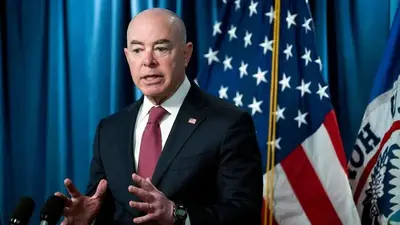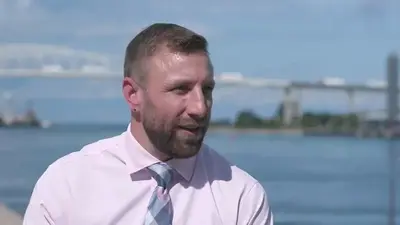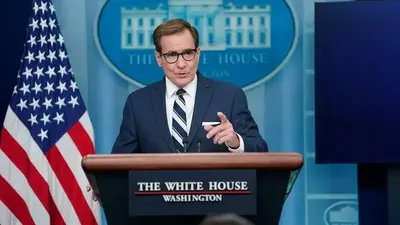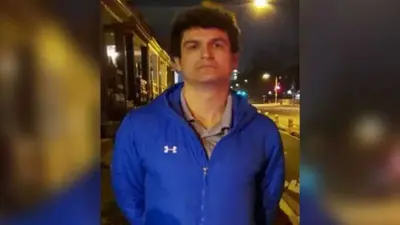Politics
'This Week' Transcript 10-22-23: Secretary of Defense Lloyd Austin, Sen. Tim Scott, Rep. Michael McCaul and Cindy McCain
A rush transcript of "This Week with George Stephanopoulos" airing on Sunday, October 22, 2023 on ABC News is below. This copy may not be in its final form, may be updated and may contain minor transcription errors. For previous show transcripts, visit the "This Week" transcript archive.
JONATHAN KARL, ABC "THIS WEEK" ANCHOR: Joining us now is Secretary of Defense Lloyd Austin.
Secretary Austin, thank you for being here.
I want to start with those moves you announced late yesterday, last night. You've got the USS Eisenhower going to the Persian Gulf. You've got more missile defense systems headed to the region. Troops put on standby. What's behind these moves?
LLOYD AUSTIN, SECRETARY OF DEFENSE: Well, Jonathan, as you know, recently we’ve seen rocket and UAV attacks against bases housing our troops in Iraq and Syria. We're concerned about potential escalation. In fact, what we're seeing is a -- is a prospect of a significant escalation of attacks on our troops and our people throughout the region. And because of that, we're going to do what's necessary to make sure that our troops are in the right -- in a good position, and they're protected, and that we have the ability to respond.
Now, this additional deployment sends another message to those who would -- who would seek to widen this conflict. As President Biden said earlier and as you've heard me say, if any group or any country is looking to widen this conflict and take advantage of this very unfortunate situation that we see, our advice is don't. We maintain the right to defend ourselves, and we won't hesitate to take the appropriate action.
KARL: Well, in fact, we saw the USS Carney take down those Houthi missiles. Houthis, again, that's an Iranian-backed group in Yemen and also several drones.
Were -- was that takedown defending our ships in the region or was it defending Israel?
AUSTIN: Jonathan, when you have cruise missiles heading towards one of our DDGs, one of our destroyers, that vessel is going to do what it needs to do to protect itself. The same applies for the UAVs.
And I applaud the work of the crew of the Carney. They demonstrated what the -- what our very capable United States Navy can do and will do if challenged.
KARL: And you've given the authority to do that. That was done in an instant.
AUSTIN: They have the inherent right for self-protection there, Jon. Yeah.
KARL: And could we see similar actions if we see Hezbollah or if we see Iran start lobbing missiles towards Israel? I mean, are we effectively ready for air cover for the Israelis?
AUSTIN: Jon, what we're focused on currently is making sure that we're providing the security assistance that Israel needs to defend itself. That's been our focus from the very beginning, and I will tell you that I am in contact with Minister Gallant nearly every day.
I spoke to him on October 7th, the same day that the attack occurred. He identified to me what his needs were at that point in time, and we immediately started flowing security assistance to them.
KARL: And they're about to launch this ground offensive in Gaza. You were at CentCom. You were the CentCom commander when ISIS had control of Mosul, and it took nine months, but you cleared ISIS out of Mosul with our Iraqi and Kurdish partners.
What was that -- what were the lessons you learned there that apply here?
AUSTIN: Well, the first thing that everyone should know, and I think everybody does know that urban combat is extremely difficult. It's -- it goes at a slow pace.
KARL: That was nine months.
AUSTIN: Yes.
KARL: Nine months of intense combat.
AUSTIN: Yes.
This may be a bit more difficult because of the underground network of tunnels that the -- that Hamas has constructed over time, and the fact that they have had a long time to prepare for a fight. So I think you'll see a fight that's characterized by a lot of IEDs, a lot of booby traps, and just a really grinding activity going forward.
Now, one of the things we've learned is how to account for civilians in the battle space, and they are a part of the battle space, and we, in accordance of the law of war, we've got to do what's necessary to protect those civilians.
And as I’ve talked to Minister Gallant and others, I’ve encouraged them to conduct their operations in accordance with the law of war.
KARL: And I want -- I want to ask you on that. We heard some pretty stark words from King Abdullah of Jordan, again, an American ally, no friend of Hamas, obviously, but very critical of what the Israelis have done so far. Let me bring up what he said.
He said: The relentless bombing campaign under way in Gaza, as we speak, is cruel and unconscionable on every level. It is collective punishment on a besieged and helpless people. It is a flagrant violation of international humanitarian law and a war crime.
Is Israel doing enough to protect or to ensure that innocent civilians aren't getting -- getting killed in this?
AUSTIN: We encourage them at every opportunity, Jon, to make sure that, you know, we're accounting for those civilians that are in the battle space that were providing corridors for them to leave the battle space if necessary, and that -- and that they're allowing humanitarian assistance to get into that space as well.
KARL: I – I – Lieutenant Colonel Peter Lerner, one of the Israeli Military spokesmen, told ABC this week, “if Hamas places a rocket in the courtyards of schools, we’re going to strike that.”
What – I mean how – what’s your sense – and these are, obviously, incredibly difficult decisions. But is a school a legitimate target if Hamas is using it effectively for cover? How do you – how – how would you handle that? You – you dealt with things like this with -- in Mosul.
AUSTIN: Certainly, you have to evaluate the target, the value of the target, who's on that -- who's on that – who’s at that location. And we always have -- we always get legal advice from our – our – our lawyers who are with us on the battlefield. But, to your point, each target, Jon, needs to be assessed, carefully assessed, and we need to do everything we can to make sure that civilians are not -- are not injured or threatened.
So, the right thing to do is to make sure that we account for civilians in our planning, that we provide corridors for – for their movement out of the battle space, that we are not -- not destroying protected properties in the -- where possible. And I think the Israelis have been doing this for some time. Again, they are a professional force, and we will encourage -- continue to encourage them to make sure that they're doing things in accordance with the law of war.
KARL: At the beginning of the ground invasion in Iraq in 2003, David Petraeus, of course, famously asked the question, tell me how this ends. So how does this end? Israel goes in. Ground offensive in Gaza. What -- what next?
AUSTIN: Well, it’s got – it’s -- it has to transition to something else, Jon. And I think – you know, Hamas is a terrorist organization. And this is not the Palestinian people. Hamas, at the end of the day, Israel wants Hamas to be gone from – from Gaza. What does it transition to? Left to be defined, but I think that's an issue for the region and for the world to – to work together on.
Hamas is not only just an organization. It's an ideology.
KARL: Yes.
AUSTIN: And so it's a – it’s an idea. It's a bad idea. And the way you defeat a bad idea, Jon, is with a better idea. And I do think, going forward, the community needs to work together to address the underlying causes of instability here. And until we do that, then I think we're going to have -- continue to have challenges. But I think the Israelis understand that. They know that. And I think that's the direction that we all hope that we'll move in the future.
KARL: In other words, back toward the idea of a two-state solution.
AUSTIN: As you know, Jon, that's been – that’s been our position all along, a two-state solution is something that we think is – is very, very supportable.
KARL: All right, Secretary Austin, thank you very much for coming in this morning to talk to us.
AUSTIN: Thanks, Jon.
JONATHAN KARL, ABC "THIS WEEK" CO-ANCHOR: For more on the humanitarian crisis facing Gaza, let’s bring in the executive director of the United Nations World Food Programme, Cindy McCain, who joins us from Amman, Jordan.
Cindy, you have been conducting shuttle diplomacy to try to get aid convoys into Gaza. We’re starting to see some aid flow. But how dire is the humanitarian crisis right now in Gaza?
CINDY MCCAIN, U.N. WORLD FOOD PROGRAMME EXECUTIVE DIRECTOR: Well, first of all, thank you for covering this.
The situation is catastrophic in Gaza right now. There has been no food, no water, no electricity. You’ve heard all the stories.
Yesterday we were able to get 20 trucks to cross. And by that 20 trucks total, three of which were WFP. And so we were able to feed about 200,000 people last night during dinner.
But that’s not enough. That’s a drop. We need – we need secure and sustainable access in there, in that region, so that we can feed.
This is a catastrophe happening and we just simply have to get these trucks in.
KARL: And you have – you have the material there on the ground in Egypt ready to go in. It’s a matter of getting the – getting the clearance.
MCCAIN: Yes.
KARL: And – and – and what’s holding it up?
MCCAIN: Well, I think a number of things are. we were able to get 17 more trucks in just now actually, just a little while ago I understand. And there is a proposed 40 more tomorrow. But this dripping of the system is not going to work. At one – and prior to the war beginning, there were about 400 trucks a day going through. So, you know what – what it could be.
We simply have to have this because – because, as I said, people are starving but also this is a – this is a national security issue for everyone in this region. Starvation and – and the lack of food is – is a security issues. And so we just want to make sure that people can feed themselves and that, you know, we have the opportunity and the ability to give them a sustainable life as best we can.
But remember, this is a war zone and things are very fluid. And so that’s why these trucks have got to be able to get – we have to be able to get these trucks in safely and sustainably.
KARL: But how do you ensure it gets to the people who need it and doesn’t get it in the hands of Hamas?
MCCAIN: Well, we have a WFP team that’s already on the ground. They’ve been there for a long time. And so we have the – we have the implements in place. We are able to track and trace our bags. We’re able to – to – to make sure from – from an electronic standpoint that our – that our folks who are supposed to get the aid are actually the people that are getting the aid. So, we do the very best we can to make sure that it does go to the right people.
But, again, as I said, this is a war zone and things happen. And I'm – and that – that is tragic in – in the – in the end. But, believe me, we do the very best we can.
KARL: All right, Cindy McCain, and thank you for the work you’re doing on the ground.
Up next, there’s still no speaker of the House. We’ll talk to Republican Congressman Michael McCaul, the chair of the House Foreign Affairs Committee.
We’ll be back in two minutes.
(COMMERCIAL BREAK)
KARL: It's been almost three weeks since Kevin McCarthy was ousted as speaker of the House, and there is no sign of the end of the chaos. We're joined now by House Foreign Affairs Committee chair and Republican Congressman Michael McCaul.
We'll get to the House in a moment, but first, you heard what Secretary Austin had to say. How concerned are you about this war expanding, about a real escalation in the Middle East?
REP. MICHAEL MCCAUL, FOREIGN AFFAIRS COMMITTEE CHAIR & (R) TEXAS: Yeah, I think escalation is the -- the biggest fear. You could hear it in the secretary's voice, saying the biggest risk is this factor. That's why he's deploying, you know, the -- you know, the two aircraft carriers, the destroyer ships, 2,000 marines. We've had our military bases shot at by proxies of Iran now, without a response.
And I -- I actually talked to him backstage and applauded him for putting force protection in, because Hamas and Hezbollah only see one thing, and that's power. If we project power and deterrence, they will back down. If we -- if they see weakness, they will fire.
And what I worry about Hezbollah, Jon, is that they have 100,000 rockets and precision-guided weapons that can overload the Iron Dome. So --
(CROSSTALK)
KARL: I mean, much more than Hamas has ever had.
MCCAUL: They’re the A-team. It’s like Hamas is, like, Little League Baseball.
KARL: Yeah.
MCCAUL: I mean -- so, what we're worried about is, as the -- as the IDF, the Israelis go on the ground, which is a very dangerous thing to do house by house like we did in Iraq, that that could trigger an escalation by Hezbollah.
KARL: And you are working on an authorization for the use of military force. I mean, what were the prospects of America really becoming involved? I mean, we're already -- the shots -- first shots have been fired by the USS Carney.
MCCAUL: Yeah, we don't want to see that, and that's why, you know, if we provide deterrence, now, we hopefully can avoid war. Any time you see -- you demonstrate weakness, you invite aggression.
So, the AUMF, I’ve been working on to repeal 2001 and 2002, modernize it to the current threat, and I’ve been working on this even before this event even happened.
KARL: Yeah.
MCCAUL: The discussion with the White House that I’ve had -- that I have was that the -- the proxies of Iran should be included. What has changed since 9/11, right? 2001's 9/11, AUMF.
What has changed? It's these terror proxies of Iran, and I believe they need to be added to the authorized use of Military force.
KARL: And we also have the administration has got a supplemental funding request that includes Israel and Ukraine.
Let's take a look at what's in the package -- $61 billion for Ukraine, $14 billion for Israel, $9 billion for humanitarian aid, $7 billion for the -- for bolstering the defense of Taiwan, $14 billion for the U.S. border.
You're in favor of this package?
MCCAUL: I’m in favor of the concept of linking the biggest threats to the free world, and that is, you know, since the fall of Afghanistan, Putin invaded, you know, Ukraine. That's a threat to Europe. Chairman Xi is threatening Taiwan, the Pacific, and now, we have a war in the Middle East.
So it links all that, including the southwest border that I think is also a threat --
KARL: Yeah.
MCCAUL: -- right here (ph) in the homeland, and all these radical elements could get into the United States.
So, I’m in favor of linking all of this.
We’re going to -- we're looking at the numbers. The House, you know, we have the power of the purse, and we appropriate the money.
The Ukraine piece is a little deceptive because only half of that really goes to Ukraine. The other half, the $30 billion of the $60 billion really goes to replenishing and modernizing our stockpiles, our Military stockpiles.
KARL: To replenish what we've already sent over to Ukraine.
MCCAUL: And modernizing our weapons.
KARL: Yeah.
MCCAUL: And our defense industrial base --
(CROSSTALK)
KARL: So, what do you say to your fellow Republicans who say they don't want these -- these combined, and they think this is too much for Ukraine, that they shouldn't be linked? What -- what’s your answer to that?
MCCAUL: I think it would be very dangerous to abandon our allies at this critical time. I haven't seen it more dangerous since my dad's war, World War II. When I was in Poland, they said this is, like, 1939, you know?
KARL: Yeah.
MCCAUL: And Hitler invading Poland. I saw the refugees from Ukraine coming over.
You know, my guys, they just -- and gals, they want more oversight, you know? They want accountability.
They also want to plan a path to victory and a strategic objective, and I think that's fair, and the administration has not laid that out yet. And I think that's what they want to see with Ukraine.
KARL: Of course, I guess you would need a speaker of the House before you can get any of this done. What --
MCCAUL: You know, a little on detail.
KARL: What the hell's going on?
MCCAUL: It’s -- I have to say, it’s my tenth term in Congress.
KARL: Yeah.
MCCAUL: This is probably one of the most embarrassing things I’ve seen because if we don't have a speaker of the House, we can't govern. And every day that goes by, we're essentially shut down as a government.
We have very important issues right now, war and peace, and we cannot deal with an aid package, or my resolution condemning Hamas and supporting Israel. We can’t do that.
KARL: You can't even pass a resolution condemning Hamas.
MCCAUL: Because --
(CROSSTALK)
KARL: So, are you supporting -- I mean, I’ve lost count now. I think we're pushing a dozen candidates and potential candidates for speaker. Who are you supporting?
MCCAUL: Look, I -- I haven't decided, but I want a speaker in the chair so we can move forward and cover my issues, my committee of war and peace.
It's too dangerous right now. The world's on fire. This is so dangerous what we're doing.
And most importantly, it's embarrassing because it empowers and emboldens our adversaries like Chairman Xi who says, you know, democracy doesn't work.
KARL: Is there any possibility of -- I don't want to say coalition government, but is there any possibility that you're just going to need some kind of an arrangement that has Democratic support as well?
MCCAUL: This is, you know, discussed. I mean, if you can't get to 217 within our conference --
KARL: Which is really not a strange hypothetical, it seems that way. Yeah.
MCCAUL: -- on the floor, you know, how do you get there? But I think for some, they see that as very dangerous as well.
KARL: But you wouldn't rule it out if --
MCCAUL: You know, I'd rather it be the Republicans nominating and voting on the floor for a Republican Speaker. But this can't go on forever. I don't know if we're going to have a speaker next week. I don't know how this plays out.
KARL: All right, Chairman McCaul, thank you for joining us.
MCCAUL: (INAUDIBLE).
(BEGIN VIDEO CLIP)
SEN. TIM SCOTT, (R) PRESIDENTIAL CANDIDATE & (R) SOUTH CAROLINA: I am sick and tired of people saying to Israel, settle down. Whether it's Joe Biden or one of my opponents. I am hoping that Israel will wipe Hamas off the face of the map.
(END VIDEO CLIP)
JONATHAN KARL, ABC "THIS WEEK" ANCHOR: South Carolina senator and Republican presidential candidate, Tim Scott, speaking about the war between Israel and Hamas, joins us now.
Senator Scott, thank you for being here.
SCOTT: Good morning, Jon.
KARL: So, we've seen overnight the Pentagon is -- has boosted U.S. forces in the region. We have a second aircraft carrier headed to the region, headed to the Persian Gulf. What is your sense of what the United States Military should be prepared to do to protect Israel if this war expands?
SCOTT: Well, there's no doubt that the escalation in the Middle East seems to be happening before our very eyes. The two carriers are – some -- one of them's already shooting down rockets. What we need to be prepared for is one of the reasons why we saw the fad missile system -- anti-defense system go into the Middle East is because we've seen conflict coming and we’ve seen rockets fired not only at Israel, but we’ve seen our own troops under pressure and, frankly, under attack as well.
So, what we need to do is make sure that we put the blame where it belongs, and that's on Iran. We need to send the clearest message that if we see the death of more Americans, that that is on the shoulders, frankly, and in the hands of Iran. We need to deal with Hamas and Hezbollah by giving Israel the resources, the equipment. They already have the manpower. They've called up 360,000 troops. But fighting a war on two different borders is going to be something we should keep our eyes on. And we should send the message to Hezbollah, stand down or there will be consequences.
KARL: The president is asking for an emergency funding request, which includes $14 billion for Israel, $60 billion for Ukraine, also money for the border, money to protect our -- Taiwan. Are you in favor of that package?
SCOTT: I am not, as the package is currently constructed. I believe that leveraging the challenges in the war with Israel to get more assistance for Ukraine at that level of $60 billion is too much, and we need to have a single focus on bringing Congress together behind the support for Israel. That package would pass overnight. Having a package that's splintered makes it more difficult to get through the houses of Congress and give the aid where to we need it and sending a unified support to Israel.
KARL: But you -- you support aid to Ukraine. You support aid to Israel. If these come together, if that’s the way this bill comes up, you're not going to vote against it, are you?
SCOTT: I will in the current construct. There's no doubt that we spent about -- over the last two years $100 billion to Ukraine in this one package. It’s $61 billion for Ukraine. Only $14 billion for Israel. Israel is at the beginning of a long, protracted war. I think we are much better off, better served as a nation, focusing our resources and our attention immediately on Israel and continuing to provide the kind of level of accountability and responsibility the American people want to see as it relates to the resources for Ukraine.
If we do those separately, I believe we get the Israel package done almost overnight, and then we have the longer process of providing more resources depending on the level to Ukraine.
But, most importantly, I’d say, there is the southern border that must be addressed in the middle of this. One of the challenges that we've seen on our southern border are people coming from actually Iran, from Yemen, from Syria. Thousands of people have crossed our southern border, and on both sides of the aisle. The one thing we can agree upon is that the national security threat, represented by an unsafe, insecure, and wide open border, has never been higher than it is today.
KARL: I want to ask you about something that you said just a few days after October 7th, when Hamas attacked. You said that Joe Biden had blood on his hands. That didn't really sound like the Tim Scott that I know, the hopeful, optimistic campaign you talked about running.
But sometimes, in the heat of the campaign, you say things that -- that maybe you regret. Do you regret saying that, of saying that the president of the United States has blood on his hands?
SCOTT: I don't, actually. I'm a happy warrior, without any question. But we are now in the midst of a conflict, and so the warrior in me requires responsibility to start at the top. When you think about the fact that the weakness of Joe Biden attracts conflict around this world, and frankly, the negotiations with Iran is -- was specifically I was talking about. Six billion dollars for hostages only creates a bigger market for Americans abroad.
KARL: But -- but, Senator, if -- if...
SCOTT: And that money...
KARL: If I can just...
SCOTT: Jon, let me finish.
KARL: OK.
SCOTT: Let me finish, Jon. That money, we know Hamas's first thank you was to Iran. Ninety percent of their money comes from -- from Iran. Put those pieces of the puzzle together. That's why this administration froze those dollars just last week.
KARL: But -- but, I mean, I'm glad you mention they froze the money, because none of that money has gone to Iran, none of it. And you said that he has blood on his hands. I mean, with all due respect...
(CROSSTALK)
KARL: ... the blood is on the hands of Hamas. And to say that Joe Biden is complicit, which you also said, in the greatest, deadliest attack...
SCOTT: Yes.
KARL: ... on the Jewish people since the Holocaust, I mean, that -- that's beyond the pale, isn't it?
SCOTT: Well, Jon, let's just...
KARL: You don't -- you don't really think he has...
SCOTT: ... go right back to where we find ourselves. Jon, let -- let me finish my thought here, because I think it's important for your viewers to hear the actual truth, as I see it. There's no doubt that, when you have President Biden negotiating with the Iranians for the release of hostages -- I said this under President Obama as well. When the -- when we paid $400 million for hostages, you are creating a market for -- for American lives to be lost. When you pay $6 billion, do not be surprised when the result of that $6 billion leads to more conflict in the Middle East. And we've seen more than 30 Americans lose their lives.
I'm saying with great clarity that weakness from the American president, plus the negotiations, leading to terrorist attacks by negotiating with the number one state sponsor of terrorism in the world. Yes, it creates complicity.
KARL: OK. But I -- I think we can agree that the blood is on the hands of Hamas. That's who is to blame for what happened.
SCOTT: We can agree that -- no doubt, the...
KARL: OK.
SCOTT: The person who pulls the trigger is primarily responsible, but that does not release the president of our country as being complicit and responsible in what we're seeing...
KARL: Those are...
SCOTT: ... unfold in part.
KARL: OK. Senator Scott, thank you for joining us. Appreciate your time.
-
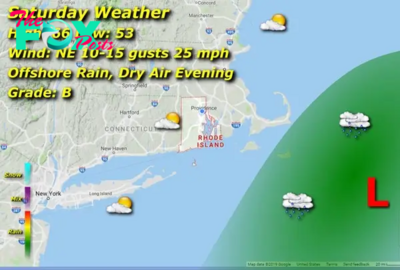
 Politics1d ago
Politics1d agoRhode Island Weekend Weather for May 18/19, 2024 – John Donnelly
-

 Politics1d ago
Politics1d agoRare and Unusual Plant Sale this weekend – 32nd year at the Southside Community Land Trust
-

 Politics1d ago
Politics1d agoSome states’ populations are very much like the US overall – including 5 key states in the 2024 presidential election
-

 Politics1d ago
Politics1d agoModi’s anti-Muslim rhetoric taps into Hindu replacement fears that trace back to colonial India
-

 Politics1d ago
Politics1d agoA silent Trump with eyes closed and a convicted liar on the stand − 2 experienced observers of Trump’s criminal trial discuss what stands out
-
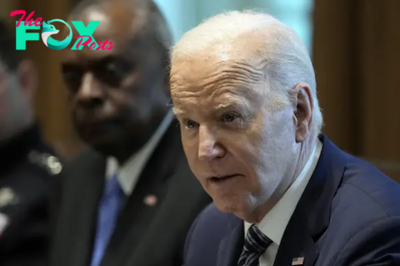
 Politics1d ago
Politics1d agoWhite House Blocks Release of Biden’s Special Counsel Interview, Says GOP Is Being Political
-

 Politics1d ago
Politics1d agoSpring Visitors Weekend: West Place Animal Sanctuary, Tiverton
-
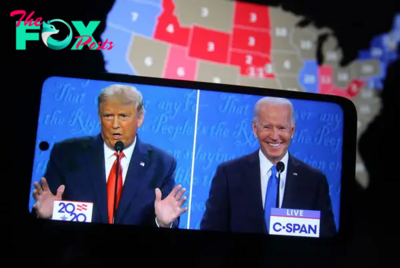
 Politics2d ago
Politics2d agoWhen Are the 2024 Presidential Debates?
